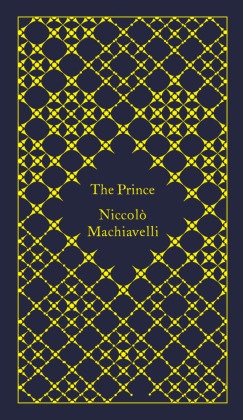The Prince - Der Fürst, englische Ausgabe
| Verlag | Penguin Books UK |
| Auflage | 2015 |
| Seiten | 240 |
| Format | 11,2 x 17,5 x 2,2 cm |
| Gewicht | 245 g |
| Artikeltyp | Englisches Buch |
| Reihe | A Penguin Classics Hardcover |
| Übersetzer | Tim Parks |
| ISBN-10 | 0141395877 |
| EAN | 9780141395876 |
| Bestell-Nr | 14139587EA |
Par. Niccolò Machiavelli\'s brutally uncompromising manual of statecraft, The Prince is translated and edited with an introduction by Tim Parks in Penguin Classics.
As a diplomat in turbulent fifteenth-century Florence, Niccolò Machiavelli knew how quickly political fortunes could rise and fall. The Prince, his tough-minded, pragmatic handbook on how power really works, made his name notorious and has remained controversial ever since. How can a leader be strong and decisive, yet still inspire loyalty in his followers? When is it necessary to break the rules? Is it better to be feared than loved? Examining regimes and their rulers the world over and throughout history, from Roman Emperors to renaissance Popes, from Hannibal to Cesare di Borgia, Machievalli answers all these questions in a work of realpolitik that still has shrewd political lessons for today.
Tim Parks\'s acclaimed contemporary translation renders Machiavelli\'s no-nonsense original as alarming and enlightening as when it was first written. His introduction discusses Machiavelli\'s life and reputation, and explores the historical background to the work.
Niccolò Machiavelli (1469-1527) was born in Florence, and served the Florentine republic as a secretary and second chancellor, as ambassador and foreign policy-maker. When the Medici family returned to power in 1512 he was suspected of conspiracy, imprisoned and tortured and forced to retire from public life. His most famous work, The Prince, was written in an attempt to gain favour with the Medicis and return to politics.
If you enjoyed The Prince, you might like Plato\'s Republic, also available in Penguin Classics.
\'A gripping work, and a gripping translation\'
Nicholas Lezard, Guardian
\'Tim Parks\'s swift and supple new translation brings out all its chilling modernity\'
Boyd Tonkin, IndependentPar.
Leseprobe:
I
How many kinds of principality there are and the ways in which they are acquiredAll the states, all the dominions under whose authority men have lived in the past and live now have been and are either republics or principalities. Principalities are hereditary, with their prince\'s family long established as rulers, or they are new. The new are completely new, as was Milan to Francesco Sforza, or they are like limbs joined to the hereditary state of the prince who acquires them, as is the kingdom of Naples in relation to the king of Spain. Dominions so acquired are accustomed to be under a prince, or used to freedom; a prince wins them either with the arms of others or with his own, either by fortune or by prowess.
Rezension:
[Machiavelli] can still engage our attention with remarkable immediacy, and this cannot be explained solely by the appeal of his ironic observations on human behaviour. Perhaps the most important thing is the way he can compel us to reflect on our own priorities and the reasoning behind them; it is this intrusion into our own defenses that makes reading him an intriguing experience. As a scientific exponent of the political art Machiavelli may have had few followers; it is as a provocative rhetorician that he has had his real impact on history. from the Introduction by Dominic Baker-Smith

